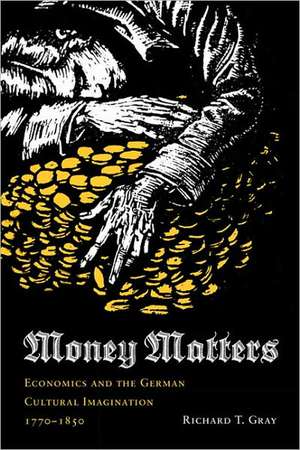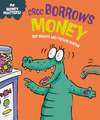Money Matters – Economics and the German Cultural Imagination, 1770–1850: Money Matters
Autor Richard T. Grayen Limba Engleză Hardback – 11 noi 2008
Preț: 657.94 lei
Preț vechi: 854.47 lei
-23% Nou
125.91€ • 130.97$ • 103.95£
Carte tipărită la comandă
Livrare economică 14-28 aprilie
Specificații
ISBN-10: 0295988363
Pagini: 464
Ilustrații: 16 illustrations
Dimensiuni: 161 x 236 x 36 mm
Greutate: 0.89 kg
Editura: MV – University of Washington Press
Seria Money Matters
Recenzii
"Money Matters is both a manifesto for what Gray terms the 'New Economic Criticism' and a model of how it should be done. He argues against the notion that culture and economics have nothing to do with one another, insisting instead that German aesthetic theory and artistic practice are deeply implicated in a parallel discourse about the meaning of money at a time of sweeping political, cultural, and economic change. Money Matters is a landmark study that belongs to the very best work in German studies today." Todd Kontje, author of German Orientalisms "Who would have thought that books devoted to German literature and cultural history of past centuries could be so timely and strike so deep? Dealing with a geographically and historically remote subject matter--the economic imagination in eighteenth- and nineteenth-century German literature--Money Matters hit the market amidst the deep global recession of 2008. Suddenly, everything was a matter of money: we always had known that money mattered, but now we felt it. Yet most people understood little about the elusive, virtual nature that had come to define money in recent decades. With perhaps unintended, but nevertheless anticipatory foresight, Richard Gray's book enlightens us about the origins of money's problematic career and about the ways in which monetary matters have preoccupied fiction, the literary imagination, and--by implication--the narrative and dramatic fables of the modern Self." - Birgit Tautz (Bowdoin College), H-German
Notă biografică
Cuprins
Introduction
Part One: Economics and Intellectual Culture
Chapter 1 / Buying into Signs: Money and Semiosis in Eighteenth-Century German Language Theory
Chapter 2 / Hypersign, Hypermoney, Hypermarket: Adam Muller's Theory of Money and Romantic Semiotics
Chapter 3 / Economic Romanticism: Monetary Nationalism in Johann Gottlieb Fichte and Adam Muller
Chapter 4 / Economics and the Imagination: Cultural Values and the Debate over Physiocracy in Germany, 1770-1789
Part Two: Literary Economies
Chapter 5 / Counting on God: Economic Providentialism in Johann Heinrich Jung-Stilling's Lebensgeschichte
Chapter 6 / Deep Pockets: The Economics and Poetics of Excess in Adelbert von Chamisso's Peter Shlemihl
Chapter 7 / Red Herrings and Blue Smocks: Commercialism, Ecological Destruction, and Anti-Semitism in Annette von Droste-Hulshoff's Die Judenbuche
Chapter 8 / The (Mis)Fortune of Commerce: Economic Transformation in Adalbert Stifter's Bergkristall
Conclusion / Limitless Faith in the Limitless: Money, Modernity, and the Economics/Aesthetics of Mediation of Goethe's Faust II
Notes
Bibliography
Index



